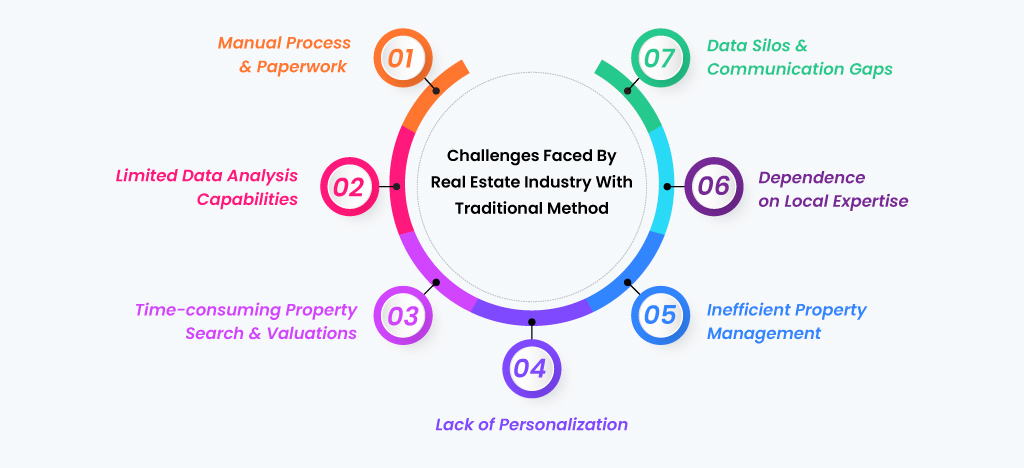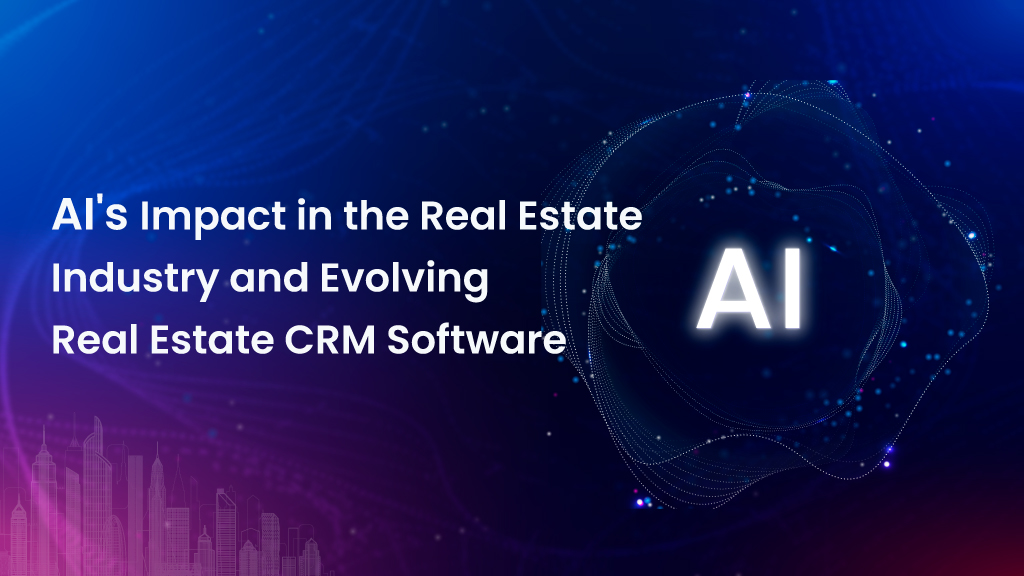AI’s transformative power in the real estate sector is making a significant mark, particularly in how CRM systems are utilized. Agents and brokers looking for the “best CRM for real estate” now expect more than just a database; they seek intelligent platforms that can predict customer behavior, automate mundane tasks, and provide actionable insights.
As AI is emerging in every industry real estate is no exception and there is an expectation of market size of AI in real estate to grow up to $ 1335.89 billion by 2029, at a CAGR of 35% during the forecast period.
Let’s dive deep into understanding how AI is going to revolutionize the real estate industry and property management CRMs are going to deeply entangle their features with AI.
Challenges Faced By Real Estate Industry With Traditional Method

- Manual Process & Paperwork: Traditional methods involve tedious, error-prone paperwork and manual entry, slowing down transactions.
- Limited Data Analysis Capabilities: Traditional systems struggle to harness and analyze vast data sets, limiting insights into market trends and customer behavior.
- Time-consuming Property Search & Valuations: Manual searches and valuations require significant time, delaying decision-making and transactions.
- Lack of Personalization: Without advanced tools, providing personalized experiences to clients based on their preferences and history is challenging.
- Inefficient Property Management: Traditional property management often leads to overlooked maintenance, miscommunication, and tenant dissatisfaction.
- Data Silos & Communication Gaps: Information stored in isolated systems creates barriers to seamless communication and data sharing among stakeholders.
- Dependence on Local Expertise: Relying solely on local knowledge limits opportunities and insights that broader, data-driven analysis could reveal.
Applications of AI in Real Estate
Chatbots and Virtual Assistants
AI-powered chatbots and virtual assistants are becoming increasingly common in the real estate industry. These tools can engage with potential buyers or renters, answer their queries, and provide them with relevant property information. Chatbots can handle multiple conversations simultaneously, ensuring a prompt and efficient response to customer inquiries. Virtual assistants can provide personalized recommendations based on the user’s preferences and generate leads for real estate agents.
Predictive Analytics
AI enables real estate professionals to leverage predictive analytics to forecast trends, identify investment opportunities, and make informed decisions. By analyzing historical data, market trends, and other relevant factors, AI algorithms can generate accurate predictions about property prices, rental demand, and overall market conditions. These predictions can guide real estate agents, investors, and developers in their decision-making processes, reducing risks and maximizing returns.
Property Search and Recommendation Systems
AI-powered property search and recommendation systems especially “property management CRMs” utilize machine learning algorithms to match potential buyers with suitable properties. These systems analyze user preferences, past interactions, and other data to generate personalized recommendations based on the user’s preferences, budget, location, and other criteria. This technology simplifies the property search process and saves time for both buyers and sellers.
Intelligent CRM Systems
AI is transforming customer relationship management (CRM) systems in the real estate industry. Intelligent CRM systems utilize AI algorithms to analyze customer data, track interactions, and identify patterns and preferences. This enables real estate professionals to provide personalized and targeted marketing campaigns, improve customer engagement and satisfaction, and enhance overall sales and marketing strategies.
The role of AI in enhancing real estate CRM software
As the real estate industry becomes increasingly competitive and technology-driven, firms are leveraging artificial intelligence (AI) to enhance their customer relationship management (CRM) software. AI, a branch of computer science that enables machines to simulate human intelligence, offers tremendous potential in revolutionizing the way real estate professionals manage their customer interactions and streamline their operations.
Predictive Analytics for Lead Generation
One of the key ways AI enhances real estate CRM software is through predictive analytics. By analyzing vast amounts of historical data and identifying patterns and trends, AI algorithms can accurately predict potential leads. This allows real estate firms to focus their marketing efforts more effectively, targeting individuals or groups most likely to convert into customers. Moreover, AI-powered CRM software can continuously learn from new data, refining its predictions and further improving lead generation capabilities.
Personalized Customer Communication
AI can also significantly improve the quality of customer communication in the real estate industry. With AI-powered CRM software, real estate professionals can leverage natural language processing (NLP) technology to analyze and understand customers’ interactions, preferences, and feedback. This enables real estate agents to engage with customers on a more personal level, tailoring their communication to individual needs and building stronger relationships. Additionally, AI algorithms can automate the sending of personalized messages and notifications, ensuring timely and relevant communication with customers.
Intelligent Property Recommendations
AI’s ability to analyze large datasets and identify patterns is particularly valuable in the real estate industry when it comes to recommending properties to potential buyers. By understanding customers’ preferences, budget, and other relevant factors, AI-powered CRM software can generate intelligent property recommendations that match their specific requirements. Through machine learning algorithms, these recommendations can become increasingly accurate over time, as the CRM software continuously learns from user feedback and interaction data.
Enhanced Data Management and Organization
Real estate CRM software often handles vast quantities of data, including property information, customer details, and transaction records. By incorporating AI, software can intelligently manage and organize this data, improving efficiency and reducing manual effort. AI algorithms can automatically categorize and tag data, ensuring easy retrieval when needed. Moreover, AI-powered CRM systems can detect and highlight unusual activities or trends, enabling real estate professionals to identify potential issues or opportunities that may require attention.
Streamlined Transaction Process
Another significant benefit of AI in real estate CRM software is streamlining the transaction process. AI algorithms can automate routine tasks, such as filling in forms or verifying information, reducing manual effort and human error. With AI’s ability to process and analyze data quickly, real estate professionals can accelerate the due diligence process, ensuring smooth and efficient transactions. This not only saves time but also leads to increased customer satisfaction and improved overall operational efficiency.
RealE 360 CRM Software: A Case Study in Innovation
An exemplary model of AI’s impact in the real estate industry is seen in the RealE 360 CRM software. Designed to meet the evolving needs of real estate professionals, RealE 360 provides a comprehensive suite of tools for sales, marketing, and property management.
Its features include automated lead generation, intelligent customer segmentation, and predictive analytics, all aimed at enhancing the efficiency and effectiveness of real estate operations. What sets RealE 360 apart is its ability to adapt and learn from user interactions, continuously its recommendations and services to better meet client needs.
FAQ
How is artificial intelligence (AI) being integrated into the real estate industry?
Artificial intelligence (AI) is revolutionizing the real estate industry by automating processes, analyzing vast amounts of data to predict market trends, and enhancing customer experiences through personalized recommendations and virtual property tours.
What specific areas of real estate operations are benefiting from AI technology?
AI technology is impacting various aspects of real estate operations, including property valuation, lead generation, marketing automation, and customer service. AI-powered tools can analyze property data, identify investment opportunities, optimize marketing campaigns, and provide predictive insights to support strategic decision-making.
How does AI-powered real estate CRM software differ from traditional CRM solutions?
AI-powered real estate CRM software differs from traditional CRM solutions by incorporating advanced algorithms and machine learning capabilities. These features enable predictive analytics, lead scoring, automated workflows, and intelligent recommendations to enhance sales and marketing effectiveness, streamline operations, and improve customer engagement.
What are some key features and capabilities of evolving real estate CRM software?
Evolving real estate CRM software offers a range of features designed to meet the unique needs of real estate professionals. These may include lead management, contact management, property tracking, transaction management, integration with listing platforms, and customizable reporting and analytics. Additionally, some platforms offer AI-driven features such as predictive lead scoring, behavioral analytics, and natural language processing for sentiment analysis.
Conclusion
AI’s integration into the real estate industry is reshaping how professionals interact with clients, manage properties, and make strategic decisions. With the continuous evolution of CRM software, powered by AI, the potential for improved efficiency, customer satisfaction, and market insight is immense. Platforms like RealE 360 CRM software exemplify the innovation occurring in the sector, offering a glimpse into the future of real estate technology. As AI continues to advance, the best CRM for real estate will undoubtedly be one that fully harnesses the power of AI to meet the dynamic needs of the industry.roving its recommendations and services to better meet client needs.





















